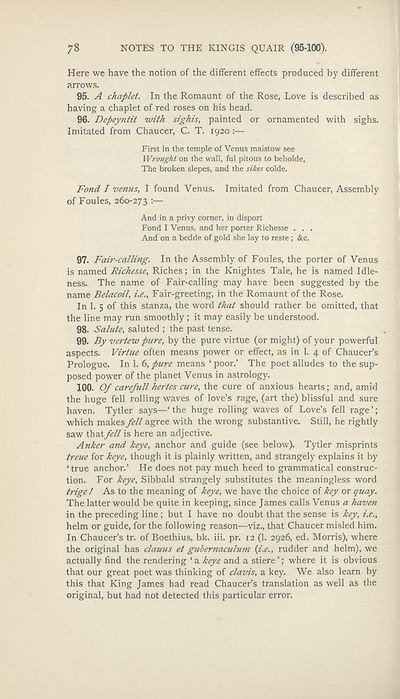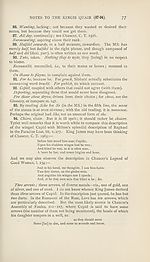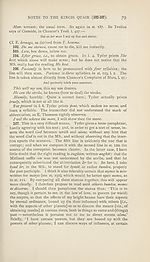Download files
Complete book:
Individual page:
Thumbnail gallery: Grid view | List view

78 NOTES TO THE KINGIS QUAIR (95-100).
Here we have the notion of the different effects produced by different
arrows.
95. A chaplet. In the Romaunt of the Rose, Love is described as
having a chaplet of red roses on his head.
96. Depeyiitit with sights, painted or ornamented with sighs.
Imitated from Chaucer, C. T. 1920:—
First in the temple of Venus maistow see
Wrought on the wall, ful pilous to beholde,
The broken slepes, and the sikes colde.
Fond I venus, I found Venus. Imitated from Chaucer, Assembly
of Foules, 260-273 '•—
And in a privy corner, in disport
Fond I Venus, and her porter Richesse . . .
And on a bedde of gold she lay to reste ; &c.
97. Fair-calling. In the Assembly of Foules, the porter of Venus
is named Richesse, Riches; in the Knightes Tale, he is named Idle¬
ness. The name of Fair-calling may have been suggested by the
name Belacoil, i.e.. Fair-greeting, in the Romaunt of the Rose.
In 1. 5 of this stanza, the word that should rather be omitted, that
the line may run smoothly ; it may easily be understood.
98. Salute, saluted ; the past tense.
99. By vertew pure, by the pure virtue (or might) of your powerful
aspects. Virtue often means power or effect, as in 1. 4 of Chaucer’s
Prologue. In 1. (>, pure means ‘poor.’ The poet alludes to the sup¬
posed power of the planet Venus in astrology.
100. Of carefull hertes cure, the cure of anxious hearts; and, amid
the huge fell rolling waves of love’s rage, (art the) blissful and sure
haven. Tytler says—‘the huge rolling waves of Love’s fell rage’;
which makes fell agree with the wrong substantive. Still, he rightly
saw that fell is here an adjective.
Anker and keye, anchor and guide (see below). Tytler misprints
treue for keye, though it is plainly written, and strangely explains it by
‘true anchor.’ He does not pay much heed to grammatical construc¬
tion. For keye, Sibbald strangely substitutes the meaningless word
trige ! As to the meaning of keye, we have the choice of key or quay.
The latter would be quite in keeping, since James calls Venus a haven
in the preceding line ; but I have no doubt that the sense is key, i.e.,
helm or guide, for the following reason—viz., that Chaucer misled him.
In Chaucer’s tr. of Boethius, bk. iii. pr. 12 (1. 2926, ed. Morris), where
the original has clauus et gubernaculum (i.e., rudder and helm), we
actually find the rendering ‘ a keye and a stiere ’; where it is obvious
that our great poet was thinking of clavis, a key. We also learn by
this that King James had read Chaucer’s translation as well as the
original, but had not detected this particular error.
Here we have the notion of the different effects produced by different
arrows.
95. A chaplet. In the Romaunt of the Rose, Love is described as
having a chaplet of red roses on his head.
96. Depeyiitit with sights, painted or ornamented with sighs.
Imitated from Chaucer, C. T. 1920:—
First in the temple of Venus maistow see
Wrought on the wall, ful pilous to beholde,
The broken slepes, and the sikes colde.
Fond I venus, I found Venus. Imitated from Chaucer, Assembly
of Foules, 260-273 '•—
And in a privy corner, in disport
Fond I Venus, and her porter Richesse . . .
And on a bedde of gold she lay to reste ; &c.
97. Fair-calling. In the Assembly of Foules, the porter of Venus
is named Richesse, Riches; in the Knightes Tale, he is named Idle¬
ness. The name of Fair-calling may have been suggested by the
name Belacoil, i.e.. Fair-greeting, in the Romaunt of the Rose.
In 1. 5 of this stanza, the word that should rather be omitted, that
the line may run smoothly ; it may easily be understood.
98. Salute, saluted ; the past tense.
99. By vertew pure, by the pure virtue (or might) of your powerful
aspects. Virtue often means power or effect, as in 1. 4 of Chaucer’s
Prologue. In 1. (>, pure means ‘poor.’ The poet alludes to the sup¬
posed power of the planet Venus in astrology.
100. Of carefull hertes cure, the cure of anxious hearts; and, amid
the huge fell rolling waves of love’s rage, (art the) blissful and sure
haven. Tytler says—‘the huge rolling waves of Love’s fell rage’;
which makes fell agree with the wrong substantive. Still, he rightly
saw that fell is here an adjective.
Anker and keye, anchor and guide (see below). Tytler misprints
treue for keye, though it is plainly written, and strangely explains it by
‘true anchor.’ He does not pay much heed to grammatical construc¬
tion. For keye, Sibbald strangely substitutes the meaningless word
trige ! As to the meaning of keye, we have the choice of key or quay.
The latter would be quite in keeping, since James calls Venus a haven
in the preceding line ; but I have no doubt that the sense is key, i.e.,
helm or guide, for the following reason—viz., that Chaucer misled him.
In Chaucer’s tr. of Boethius, bk. iii. pr. 12 (1. 2926, ed. Morris), where
the original has clauus et gubernaculum (i.e., rudder and helm), we
actually find the rendering ‘ a keye and a stiere ’; where it is obvious
that our great poet was thinking of clavis, a key. We also learn by
this that King James had read Chaucer’s translation as well as the
original, but had not detected this particular error.
Set display mode to: Large image | Zoom image | Transcription
Images and transcriptions on this page, including medium image downloads, may be used under the Creative Commons Attribution 4.0 International Licence unless otherwise stated. ![]()
| Publications by Scottish clubs > Scottish Text Society publications > Old series > Kingis quair > (138) |
|---|
| Permanent URL | https://digital.nls.uk/106994131 |
|---|
| Description | A collection of over 100 Scottish texts dating from around 1400 to 1700. Most titles are in Scots, and include editions of poetry, drama, and prose by major Scottish writers such as John Barbour, William Dunbar, Gavin Douglas, and George Buchanan. Edited by a key scholarly publisher of Scotland's literary history, and published from the late 19th century onwards by the Scottish Text Society. Available here are STS series 1-3. |
|---|

